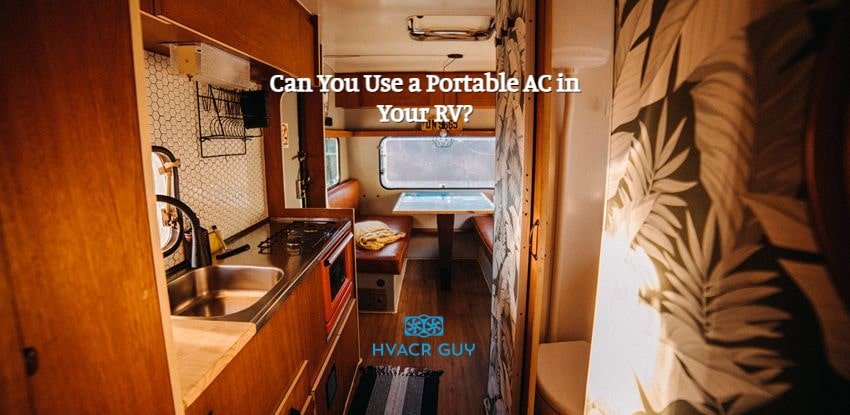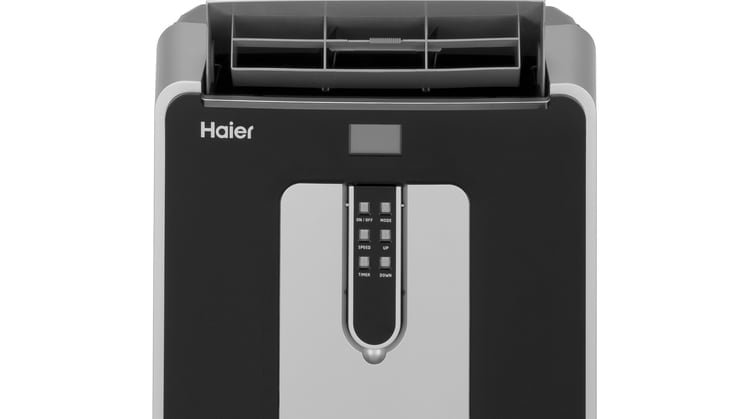Last Updated on July 18, 2023
After you have set a portable air conditioner in your room you want an uninterrupted autonomous cooling operation by it. The goal is to comfortably perform your work in the day and get a good night sleep with the AC doing its job. It could be real annoyance if your portable AC keeps turning off after short intervals.
Repeated shutting OFF or short cycling of portable AC is usually associated with the freezing of cooling coils. This can be due to a dirty filter, clogged coils, or something obstructing airflow through the unit.
A faulty thermostat or compressor overheating can also cause your portable AC to turn ON and OFF repeatedly.
There are problems like dirty filters and condensers that you can fix yourself by following the solutions suggested. However, some of the reasons for short cycling are complicated and dangerous to resolve by yourself. However, it could be a great time and money saver if you know the problem beforehand.
Why Your Portable AC Keeps Shutting Off?
There are several reasons to why your portable AC could be short cycling. The most probable causes of your portable AC turning off and on are discussed below with solutions. Best is that you diagnose from the most obvious and easiest.
1. Dirty Filter
The air that is delivered by the portable AC after passing through evaporator coils is cleaned by passing through air filter. With time the filter is blocked by dust and debris and requires maintenance.
Filter has to be cleaned after specific hours of cooling operation. This time depends on the quality of the air that passes through it i.e., dust and particles in it.
A dirty filter can lead to repeated shutting off of your portable AC due to two reasons: compressor overheating and freezing of evaporator coils. Both of these are reduced of reduced flowrate due to clogged filter.
Why AC Compressor overheats due to a dirty filter?
If the filter is not cleaned after it becomes dirty, it will restrict the air flow through it. As a result, the flow rate of the air would be reduced compared to recommended flow. In order to compensate for this loss, the compressor will have to work harder.
Consequently, system may overheat and result in turning off before the cycle is complete. If this happens continuously for a sufficiently long interval of time it can lead to permanent failure of the compressor.
Why ice develops on your AC Evaporator Coils due to a dirty filter?
Lack of airflow through the evaporator coils means reduced heat given to the air, or in simple words less refrigeration taken up by air in the room. Resultantly, their temperature drops sufficiently low to cause moisture to freeze up. AC will turn OFF for a while until all of it melts and drips in the condensate pan.
The restriction of airflow due to filter can cause other inconveniences specifically in portable ACs like filling up with water very quickly.
Solution
As this is the regular maintenance process, portable AC manufacturer make it very easy in their units for the filter to be extracted, conveniently cleaned and refitted. Usually there are no screws and filter can be extracted very easily.
Most of the air conditioners have filter reset indicator. It turns on when the filter is dirty or specific number of hours have been passed in the operation. The duration after which the filter reset light turns on is assigned by the company. The air conditioner will not turn ON until you take out the filter, clean it and then put it back on.
Summarized steps for cleaning your portable AC Filter(s):
- Extract the filter out from your portable AC.
- Clean it gently with a soft brush.
- The filters in air conditioners are almost always reusable so you will not have to change them.
- Use lukewarm water to wash the air filter gently.
- Allow it to dry properly before inserting it back.
2. Blockage of Airflow Through Vents
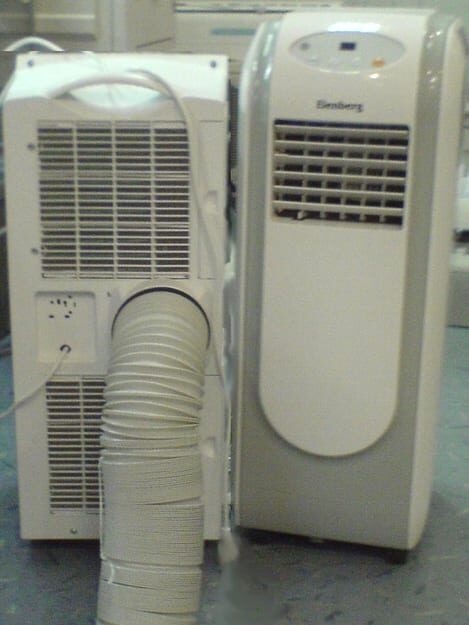
Just like your portable AC needs air through inlet and outlet hose, it requires adequate airflow to and from the room.
When this airflow is insufficient, it will result in overworking of the compressor to compensate for less amount of cool air being given OFF by AC into your living area.
There is a possibility that your unit’s compressor will overheat and eventually turn off. It will not turn on until compressor temperature drops.
However, a more probable scenario that could arise due to the obstruction of airflow is freezing of the evaporator coils. This will lead to repeated shutting OFF of your portable AC due to two reasons:
- If the airflow rate reduces below the set limit, the temperature of evaporator coils will drop below the adequate temperature. The coils will become too cool and freeze up which will cause your portable AC to shut OFF.
- After moisture buildup, eventually the ice on coils will melt into water. This water from ice will continuously drip in the condensate pan and it will fill up way quickly. This will cause your portable AC to shut OFF much sooner.
Solution
The solution is easy just keep some space around your portable AC.
The airflow from the unit to the room and vice versa must not be prohibited in any way. Plants, furniture, decoration pieces or any hindering material should be at sufficient space from your unit.
Also check the vent hoses from inside for any hindrance or solid objects. Especially make sure that the open end of hose is not blocked by anything outside the window or hole.
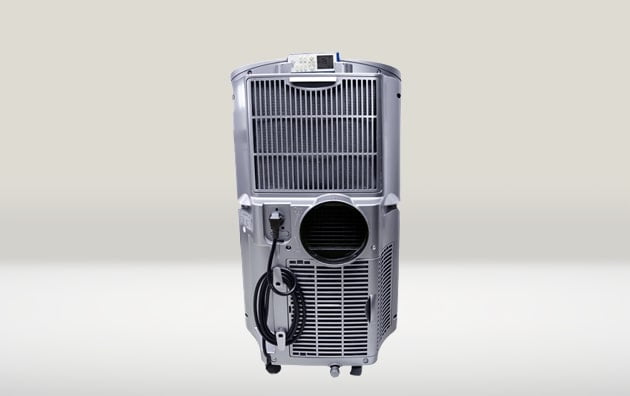
3. Lack of Refrigerant
Portable air conditioners cool by using vapor compression cycle. This is a closed refrigeration cycle. This means that the refrigerant that is flowing with in the lines is not used up. In fact, it is just interconverting between liquid and gaseous state to perform the cooling operation.
Hence, the quantity of the refrigerant in the portable AC is supposed to stay the same irrespective of the hours of operation. It is not a maintenance process. Thereby if there is a reduction in overall pressure in refrigeration lines it is due to leakage anywhere in the lines.
In case refrigerant is leaking, it will result in short cycling of your portable AC, causing it to shut off after short intervals. The reason for this is reduced pressure levels in the refrigeration line.
Why low refrigerant causes your portable AC to short cycle?
Actually, when your portable AC operates on low refrigerant quantity, the refrigerant pressure in AC lines becomes so low that the compressor turns OFF before the completion of cooling cycle.
When the pressure becomes high again, the compressor turns back on. This repeated turning ON and OFF results in high power consumption and reduction of the portable AC’s life due to wear and tear.
Solution
Here’s a summarized step-by-step approach for diagnosing and solving this issue:
- Before charging the portable AC, you will have to detect the leak(s).
- It may or may not be easy to find.
- If your portable AC got a hit someplace or you see a bend, it is very likely that there is leakage in the same area.
- After detecting the leakage, only if you have experience, you can watch the video below on how to fix those leaks.
- After fixing the leak, slowly introduce refrigerant in small quantities to the suction line. Make sure that you are using the same refrigerant that is compatible with your portable AC.
- Give time between addition to stabilize the system. You can check out a detailed guide to charging your air conditioner.
Recharging your portable AC is not a very straightforward process and requires experience. If it is your first time, and you have not done it before, I recommend that you call an HVAC professional technician to do this for you. Technician will detect the leak, patch it and recharge it for you. It will also save you a lot of time.
4. Clogged Condenser Coils
If you have blocked condenser coils, flow of air through them will be restricted.
Consequently, your portable AC will have to work harder. This may cause overheating of the condenser to the extent that AC turns OFF temporarily. The result of this extensive variation in temperature will be the short cycling of your portable AC unit.
Solution
Here are tips for accessing and cleaning your portable AC condenser coils after diagnosing them to be the cause of AC turning OFF repeatedly:
- Not every portable AC will give you access to the condenser coils. But in case it does you may clean them by using a soft brush.
- Clean the condenser coils with gentle upward and downward motion. Get rid of debris and dirt.
- Also try to keep plants and foliage away from the portable AC. Keep them away from the intake hose, in case of dual hose portable air conditioner, to prevent getting your condenser coils clogged.
- If condenser coils are not easily accessible, you may vacuum through the holes on top of the housing of condenser coils.
- You should clean the condenser coils at least once a year to keep the performance of your portable AC intact and maintain its life. Do this early and you will save yourself a lot of money and effort.
Clean carefully as the condenser coils are very fragile. In case you physically affect the condenser coils, performance of your portable AC will be compromised. The refrigerant may leak out and the only solution may be to change the condenser coils.
5. Inadequate Cooling Capacity (Portable AC too big)
Another reason for short cycling could be using an air conditioner that has way higher capacity than the size of the room.
When a high-capacity AC is operated in a relatively small room, we expect it to cool better. However, in fact it will have low efficiency and reduced quality of air conditioning. It will cool the room very quickly and turn off after running for a very short time.
This will result in more energy consumption than running of a smaller AC for longer period of time. Repeated turning ON and OFF will also add strain on your system.
Another demerit is reducing the secondary function of your AC i.e., removing humidity. When the air conditioner is of capacity relatively higher compared to the room it will not remove moisture effectively from air.
Solution
There are two ways to prevent AC short cycling due to relatively much higher power than size of the room. Either buying a separate AC unit that matches the size of the room or simply changing your room to a one that is more spacious if possible.
However, here is my take on that. This bigger unit scenario is more probable to happen in a split AC system. It is unlikely that a Portable AC unit, having cooling effectiveness way less than an equivalent Split or Central AC, short cycles due to large capacity.
It would only be possible if the size of the room is way smaller for the cooling capacity of your portable AC.
6. Faulty Compressor Unit
Compressor is the most important component of any AC system operating on vapor compression cycle. It is in fact the only necessary moving component in the air conditioning cycle. Compressor pressurizes refrigerant that is later on expanded to get the cooling effect that cools your home.
Another reason, that is rare but may lead to short cycling of your AC unit, is a malfunctioning compressor unit. If there is buildup in the compressor that is obstructing the flow of refrigerant, compressor will overheat and shut down. It will turn back on when it cools down.
The process will repeat itself resulting in the unit that keeps shutting off due to dirt and grime within compressor unit.
Solution
It is usually uncommon that the reason for overheating the compressor is within the compressor itself. However, it could happen. If that is the case, there are two options: Replace or Repair. In either case, call a certified AC technician to resolve this problem for you.
My Personal Advice: Compressor is the most expensive component of the air conditioner to replace or repair. So before making this decision, check whether it would be cost effective, when your current portable AC value is taken into account. Usually, it is better to buy a new unit.
7. Wrong Settings in Control Panel
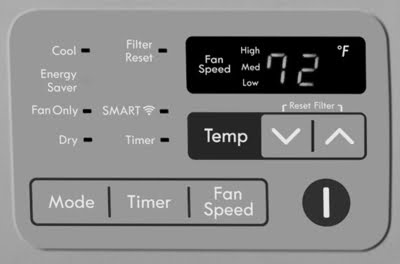
Before diagnosing any other problems in your portable AC, it is a good idea to give your control panel a check. Just to make sure that the right settings are selected, and it is not the actual cause of the unit turning on and off.
Diagnosis
- Check the timer, if your portable AC has one.
- Disable it if it is ON. If your AC turns off exactly after the same interval of time, it could probably be due to timer.
- Also make sure you have not selected a temperature on your thermostat that is close to ambient (surrounding) temperature. This may continuously switch your portable AC ON and OFF after short intervals.
- If the ambient temperature is below selected temperature, your AC will seize the cooling process.
8. Frozen Evaporator Coils
If the condensed water on cooling coils is not drained it can result in formation of frost on them. This is among the top reasons for your portable AC turning OFF repeatedly after running for short intervals.
This draining is consistently carried out by the adequate airflow through the coils. If something is hampering the airflow, then this would lead temperature of the coils low to the extent that condensed water would convert to ice. The result is hampering of airflow and thereby overworking of the compressor.
There are several reasons why ice can be formed on evaporator coils of your portable AC, resulting in its short cycling and running for short intervals.
Reason # 1
One of the common reasons is dirty filter that blocks the airflow. Cleaning and maintenance should be carried out routinely to avoid this. I have discussed the diagnosis and cleaning methods of a clogged filter in detail previously in the article.
Reason # 2
Another cause for icing of evaporator coils could be a malfunctioning fan providing reduced airflow. It the fan is not operating at adequate speed, the flow rate of the air required through the coils would decrease, resulting in freezing of the coils. I have discussed it in much more detail with remedy here.
Same thing happens in case there is obstruction of airflow by anything that is in the path of air that is delivered. There are other causes leading to frozen evaporator coils that are less probable but possible.
Reason # 3
As I mentioned previously, portable AC is not like automotive AC. It needs not to be recharged thereby, ever. The quantity of refrigerant is supposed to stay the same.
However, if there is a leak in your portable AC, the refrigerant pressure will drop, causing it to absorb more heat leading to frozen coils. The ice formed on coils is due to excessive heat absorbed from the atmosphere by expansion due to sudden lack of pressure.
Reason # 4
A malfunctioning thermostat can sense incorrect ambient temperature, overworking AC even after the desired temperature is achieved, and eventually cause frozen coils. I plan to share about its diagnosis and replacement in an upcoming section.
9. Malfunctioning Electronic Components or Electrical Wiring Problems
Consistent turning ON and OFF could also be due to electrical problems, especially if the portable AC turns OFF right away after turning ON.
There can be majorly two electrical problems: either electrical wiring is partially burnt from someplace, or you have a faulty electronic equipment like capacitor or relay.
Solution
Following are the tips to diagnose and resolve electrical problems in your portable AC:
- Give a check to your electrical wiring.
- Just trace each wire to make sure it looks okay.
- Check the connectors if they are loose.
- In most cases, if AC Capacitor is damaged you will see it bulged on top.
- It is highly uncertain that despite the bulged body of capacitor it is working fine.
- Compressor turning ON and suddenly OFF is commonly a capacitor problem as it performs the role of continuous power to compressor.
- Another electrical problem could be a faulty Relay. If you have a faulty relay, then your compressor will not turn on from the beginning.
- Relay performs the role of a switch and usually has four pins. Temperature sensors that power HVAC units require levels of amperage that vastly exceed the capacity of their wiring. Relays provide the necessary amplification to convert a small current into a larger one.
Electronic components are usually conveniently available for cheap. Although it is a simple soldering process to install the capacitor or relay, I highly recommend that if you do not have familiarity with the similar kind of work call a professional technician to replace it for you.
The video below is for diagnosis and replacement of capacitor in central air conditioning however procedure is the same in portable AC. Just make sure that you buy the relay or capacitor of the same specification required for your model.
10. Your AC Has a Faulty Thermostat
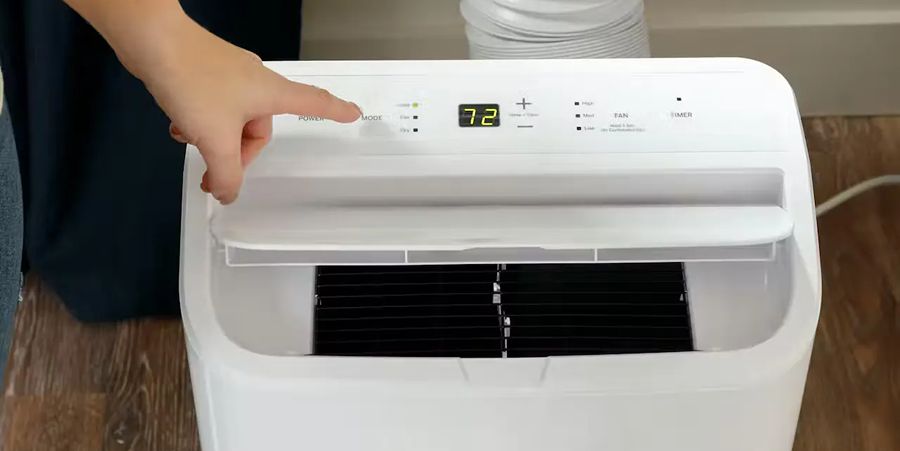
Your portable AC has a built-in thermostat that is responsible for regulating the temperature in your living space.
When you select a specific temperature in the control panel, AC will run until its thermostat detects that temperature in the environment. Once it does, it will standby cooling function until needed again.
Now if your thermostat is faulty, your portable AC unit will indicate that in certain ways. Here’s how your AC could react with a malfunctioning thermostat:
- Portable AC doesn’t turn ON.
- It never turns OFF.
- AC doesn’t turn OFF accurately at the selected temperature, i.e., it makes the room either cooler or warmer than the desired temperature.
- Portable AC short cycles or repeatedly turns OFF.
This means if your AC thermostat detects the wrong temperature, it may turn off before it has cooled the room.
Even if due to faulty thermostat, it keeps cooling after desired temperature, there is a possibility of freezing of evaporator coils. This especially could happen when the fan speed is very low.
Consequently, this would halt the portable AC operation until ice on the cooling coils melt. Eventually, ice will develop again, and the cycle will continue.
Thereby, in both scenarios of a malfunctioning thermostat i.e., detecting higher or lower temperature, your portable AC may turn OFF before the job is finished.
Solution
- The first thing I would do, after my portable AC turns OFF all of a sudden without required cooling, is to take a peek at the evaporator coils and see if they are frozen or not.
- If you see ice on cooling coils, start diagnosing your portable AC for more obvious problems mentioned in this article like a clogged filter, clogged evaporator coils, leaking refrigerants, etc. For your ease, I have also summarized them here.
- If nothing else makes sense, look if the room temperature displayed on the AC control panel display is accurate. You could do so by simply comparing it with a thermometer.
- Test your portable AC with a relatively higher temperature. See if it turns OFF at the exact temperature or it does so much earlier to that.
- If one of these generic tests fails, you probably have a faulty thermostat. Portable ACs have built-in thermostats. So you will have to open the case to properly check and replace it.
- In case you have experience, you could bypass the thermostat to check if AC keeps working continuously. Make sure to replace it with the same one recommended by manufacturer.
- If you are not comfortable with this electrical testing and replacing thermostat, my advice is to simply contact the manufacturer. You have already diagnosed the problem and saved yourself a lot of time. Ask them for a replacement for your thermostat.
11. Portable AC Blower Fan is Malfunctioning
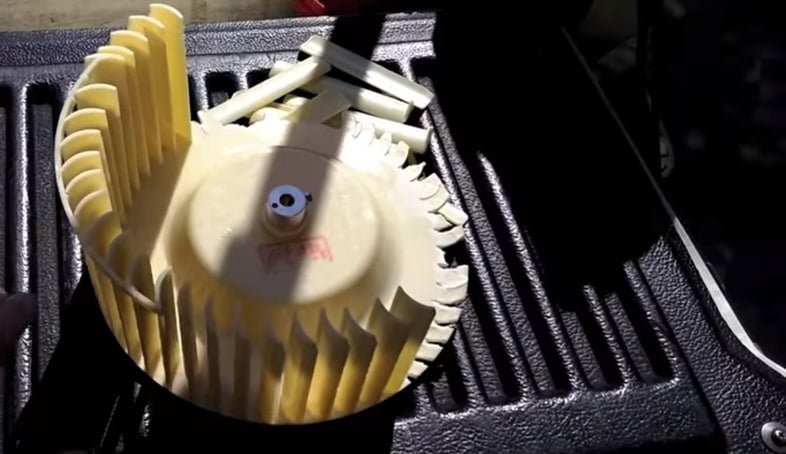
This is another cause for repeated shutting OFF of your portable AC. I talked a little about it before, but I want to discuss some more useful detail and possible remedy after listening to expert technicians.
Actually, this does not directly cause your AC to shut off but will lead to the freezing of cooling coils that will cause your portable AC unit to turn OFF.
As I said earlier, proper flow rate through cooling coils is necessary. If airflow reduces sufficiently, they will freeze, and portable AC will shut off until that ice melts.
The fan is the actual reason for that airflow, so if it stops working, even partially, there is a possibility of freezing of coils.
Solution
A faulty blower fan in a portable AC unit is relatively easier to diagnose. Why? Because you hear it when you turn your AC ON.
- AC blower fan has a distinct noise. If it is working much slower than usual, you would notice its lower noise, distinct from the compressor sound. You could also see it from the front of the unit.
- Try turning the fan speed higher and check if your fan speed increases. See if the cooling coils are still freezing, leading to the portable AC unit turning OFF.
- If you cannot increase fan speed by controls, this is an indication of improper functioning of blower fan.
- The problems with your fan motor could range from interference by any other component to mechanical problems like worn-out bearings to electrical problems like a faulty relay, bad capacitor, or burnt winding as I mentioned here.
- From this point ON, depending on your experience, you can diagnose and even replace these components. However, it is best to call a certified technician to fix that for you after diagnosis.
Useful Info: One way to tell if portable AC blower fan is mechanically hindered is to simply turn it by hand. If it takes a lot of force, this could mean bad bearings or something blocking its rotation.
How to Get the Max Out of Your Portable AC?
Scheduled AC Maintenance
Cleaning your portable AC filter is the first priority task when it comes to scheduled maintenance. Doing so will ensure smooth airflow for proper cooling of your room and prevent freezing of coils.
Your manufacturer usually indicates the duration after which filters have to be cleaned. Some units also have a filter reset indicator for this purpose. However, if you don’t know when to clean AC filters, just clean them every week for a smooth flow of cool air.
It would be great if you could clean portable AC coils at least once a year. This would ensure that coils are clear for air to pass and they have maximum surface area available for air to exchange heat and ultimately cool your room better.
If you want to know more about cleaning your portable AC, I have thoroughly covered cleaning portable AC filters and coils in detail in this article.
Stop Losing Cooling Via Windows
Preventing heat exchange through windows can greatly improve your AC’s cooling performance and save you money on electricity bills.
According to the US Department of Energy, just by using cellular shades, you can reduce unwanted solar heat through windows by up to 60%.
You could also use curtains, blinds, drapes, etc. to prevent heat exchange from outside.
If your window is in the direction of sunlight for most time of the day, a suitable installation of awnings would greatly improve the cooling performance of your portable AC and help reduce bills.
Window awnings can reduce solar heat gain in the summer by up to 65% on south-facing windows and 77% on west-facing windows.
Place Portable AC in a Well-Ventilated Area
Avoid installing the thermostat of your portable AC near an air-restricted or active temperature-fluctuating zone. This will prevent your AC from working properly.
Most portable ACs have thermostat within the unit. Keeping a suitable distance from walls and heating appliances like hair dryers, hand dryers, ovens, and kitchen appliances will ensure smooth and accurate working of your portable AC unit.
Winterize Your Portable AC Right
After the season is over, before storing your portable AC, clean it thoroughly. Clean the filters and wipe the unit clean with a vinegar solution.
If you have time, it would be great to clean coils, as shown in this article. Let the unit dry and then cover it properly to save it from dust and debris.
This way your portable AC will have improved life and best performance the next time you use it.

